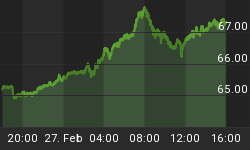Following moves by the authorities in Beijing to boost confidence in the equities market, Chinese stocks on Monday saw their biggest gains in nearly three years, surging some 4 percent, despite slowing economic growth.
Most importantly, mainland China’s benchmark gauge, the Shanghai Composite Index, closed Monday 4.1 percent higher, recording its biggest day gain in two and a half years, while the benchmark Hong Kong Hang Seng Index gained 2.3 percent for its biggest jump in a month.
The Hang Seng China Enterprises Index gained 2.6 percent, and the tech-focused Shenzhen Composite Index and Component Index gained nearly 5 percent each.
So is the Chinese stock route over, despite a trade war that continues to intensify and indications that the economy is slowing? And is this the bottom? For today, yes—and it’s all because of some well-timed policy dropping by Chinese officials.
One of the biggest saviors of the day is talk of tax cuts and bailout funds for listed companies struggling to make ends meet.
First off, Beijing has unveiled a new plan to cut personal income taxes, citing third-quarter GDP data that shows, as Bloomberg puts it “economic growth slowed to the slowest since 2009 at 6.5%”.
Speaking to Caixin, a Chinese financial magazine, People’s Bank of China (PBOC) policy advisor Ma Jun said that next year’s tax cuts and fee reductions could reach or surpass 1 percent of GDP, Reuters reported Monday.
Tax reductions for this year should already exceed 1.3 trillion yuan, without hints of even more to come. Related: Supply Issues Weigh On Pot Stocks As Canada Goes Legal
In fact, next year’s tax cuts could outdo Trump’s, Ma reportedly said.
But it’s more than just a hint that sent markets surging Monday. On Saturday, Beijing went as far as to publish a draft version of its plan for tax deductions.
The stock market rally was also bolstered by Chinese President Xi Jingping’s statement of support for the private sector in an open letter to Chinese entrepreneurs over the weekend. Not only did he lavish high praise on the private sector, but he also made it clear that the Beijing has confidence in capitalism—which, in turn, boosts investor confidence.
And that “support” isn’t just paying lip service to the private sector: In fact, the chairman of the China Securities Regulatory Commission, Liu Shiyu, delivered a speech Monday detailing measures by Beijing that would support share buy-backs, facilitate M&A approvals and bond transfers, and encourage private equity investment in stocks.
The regulatory commission also noted that it would the gap period from three years to six months for companies that plan to restructure to list again if their first IPO application is rejected, reports the South China Morning Post, noting that “this is likely to result in more back door listings”.
Related: Chinese E-Commerce Giant Eyes Aggressive Expansion
For investors in China’s massive tech sector, Liu also suggested new policies designed to support private equity investment specifically in technology.
Alibaba (BABA), China’s premier e-commerce giant, had gained over $4 on the NYSE by 10:30 Monday morning EST, after losing some 17 percent since the beginning of the year over trade war concerns:

By Michael Kern for Safehaven.com
More Top Reads From Safehaven.com:
















